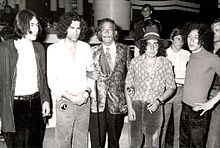
The music of Catalonia comprises one of the oldest documented musical traditions in Europe. In tandem with the rest of Western Europe, it has a long musical tradition, incorporating a number of different styles and genres over the past two thousand years.

Styx is the debut album by American rock band Styx. It was released in 1972.
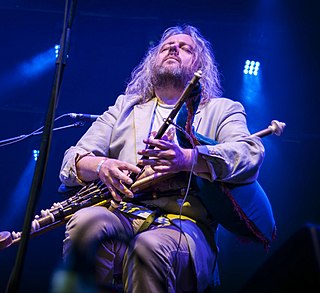
Troy Donockley is an English composer and multi-instrumentalist most known for his playing of Uilleann pipes. Having performed with many artists as a session player, he is most notable as a member of Finnish symphonic metal band Nightwish, which he has performed with since 2007 and joined as a full-time member in 2013.

Sui Generis is one of the most influential rock bands in Argentine history, enjoying enormous success and popularity during the first half of the 1970s and a following that lasts to the present throughout South America. Its youthful songs, classical at sing-along gatherings, became hymns for successive generations of Argentines and are part of the national cultural landscape. Charly Garcia was author of most ot the songs and arrangements, which went from the simple folk style guitar, piano and flute of their greatest hits in the first and second album, to the more developed symphonic/prog rock of their last concept album. Sui Generis disbanded on September 5, 1975, in a mythical concert which was turned into a popular record and film, and, despite concerts that took place in 1980 and 2001, a permanent re-formation has been ruled out.
Jordi is the Catalan form of the ancient Greek name Georgios. Jordi is a popular name in Catalonia and is also given in the Netherlands and in Spanish-, English- and German-speaking countries.
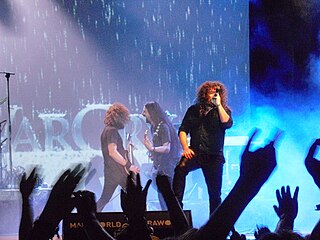
WarCry is a Spanish power metal band led by founder, singer, and songwriter Víctor García. Formed in 2001 when García and drummer Alberto Ardines were ejected from Avalanch, the band has since released seven studio albums and two live albums, with an eighth studio album currently in progress. WarCry has had a fluctuating lineup with García as the sole constant member. The band has been acclaimed as one of Spain's most famous heavy metal acts and has won numerous awards in both Spain and Latin America.
"Starless" is a composition by English progressive rock band King Crimson. It is the final track on their seventh studio album, Red, released on 1 October 1974.

Los Rabanes is a Latin Grammy winning ska rock fusion band from Chitré, Herrera, Panama. With a career spanning two decades and eight albums, they are considered pioneers in the region, and are the first band from Central America to win a Latin Grammy in the Best Rock Album Category.
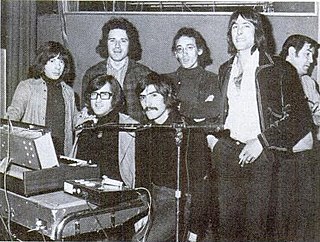
Triana was a rock band hailing from Andalusia, Spain. Formed in 1974, the band were known for blending elements of progressive rock and flamenco music to make a style known as Andalusian rock or flamenco rock.
The Nova Cançó was an artistic movement that promoted Catalan music in Francoist Spain. The movement sought to normalize use of the Catalan language in popular music and denounced the injustices in Francoist Spain. The Grup de Folk, which emerged in the same period, also promoted a new form of popular music in Catalan, drawing inspiration from contemporary American and British music.
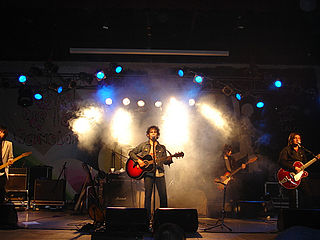
Los Bunkers is an alternative rock band from Concepción, Chile, formed in 1999 by brothers Álvaro and Gonzalo López, Mauricio Basualto, and brothers Francisco and Mauricio Durán.
PICAP is a Catalan record label headquartered in Castellar del Vallès, Spain. It was founded in 1984.

Jaume Sisa is a Spanish singer-songwriter, who defines himself as 'Galactic', and whose greatist hit was Qualsevol nit pot sortir el sol from his eponymous album, released in 1975. Songs such as Nit de Sant Joan, El setè cel and L'home dibuixat are also well-known and remembered in the Catalan linguistic area.
Companyia Elèctrica Dharma is a Catalan band. Many of its members are brothers, from the district of Sants, in the city of Barcelona. They have performed in Europe, North and South America, and Africa at music festivals such as "Rock in Rio", Rio de Janeiro (Brasil) "Memphis In May" Memphis (USA) "Festival of Essakane" (Mali) "Awesome Africa Festival" and Durban. Their albums are sold all over the world. The band's music is a fusion of Cobla, Rock, Jazz, Blues, Progressive music, and Symphonic rock.
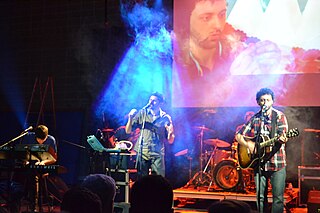
Els Amics de les Arts is one of the best-known bands of what some have called the new wave of Catalan folk-pop. Their songs are short stories made with simple melodies, touches of electronic music, wordplay and much irony.
Numen (rock band) is a Spanish progressive rock band from Alicante formed in 1992. Currently, Alba Hernández and Jorge Camarero are the new singer and guitarist, respectively.
Grup de Folk was a Catalan folk music musical association formed in 1967 and disbanded in 1968. Formed as an alternative to Els Setze Jutges, it took its inspiration from the American folk music scene at the time and introduced its styles to local audiences to revive the musical tradition of Catalonia. Among its releases were a pair of albums in 1967 and 1968 that served as the basis for many other groups in the Catalan-speaking areas. It was composed of 26 members, but many were only involved in some of its musical projects. Its many different styles and projects inside the association resulted in an early split-up that later led to the birth of progressive rock and psychedelic rock in Spain with bands such as Màquina!, in which their two co-founders, Jordi Batiste and Enric Herrera, were part of the backing band of Grup de Folk under the name of La Companyia, SL; and Música Dispersa, and singers such as Pau Riba and Jaume Sisa.
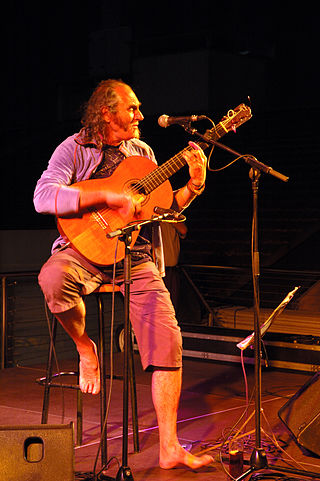
Pau Riba was a Spanish author and Mallorquín versatile artist. Riba was born in Palma de Mallorca, Spain on 7 August 1948. He started working during the 60s in the context of the counterculture. Riba died from pancreatic cancer on 6 March 2022, at the age of 73.

Los Secretos are a Spanish rock band founded in Madrid in 1978 and often associated with the movida madrileña movement.

Pic-Nic was a Spanish teenage folk-pop and sunshine pop band formed in Barcelona in the mid-to-late 1960s, composed of lead singer Jeanette, guitarists Toti Soler and Al Cárdenas, drummer Jordi Barangé and bassist Isidoro "Doro" de Montaberry. Although keyboardist Jordi Sabatés is often mentioned as a member of the band, he does not appear on any of the group's releases, having joined after their only published recording sessions had taken place. Pic-Nic was the successor to the short-lived group Brenner's Folk, originally founded by German-Venezuelan brothers Haakon and Vytas Brenner together with Soler, Barangé and Jeanette, an English girl who had recently moved to Spain after being raised in the United States. After releasing a four-song extended play for the label Edigsa in 1966, the Brenner brothers left the band, being replaced by Cárdenas and de Montaberry.
